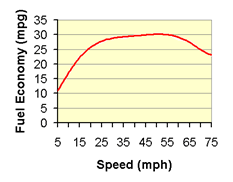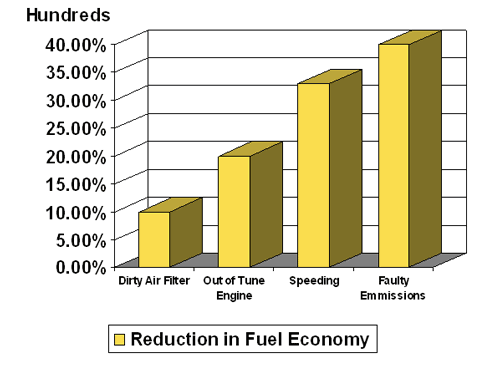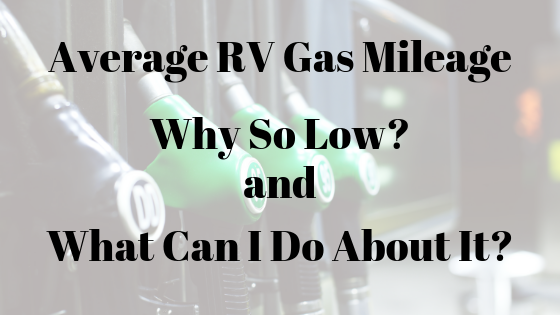Thanks for your support! If you make a purchase using our links in this article, we may make a commission. And, as an Amazon Associate, I earn from qualifying purchases. See the full disclosure here.
Updated April 1, 2024
So, you’re ready to buy or rent an RV and explore the great outdoors. And maybe you have narrowed your choice of RV down to a Class C RV. But one question lingers in the back of your mind. What kind of gas mileage will I get? Should I go with the less expensive gas engine or upgrade to a diesel engine?
Well, you are in the right place because we answer those questions and more in this article. After all, we have owned our Class C RV for 6 years, so we are very familiar with the mpg of a Class C RV.
What is the average gas mileage for a class C RV? The average gas mileage for a Class C RV is 8 to 10 miles per gallon.
We are completely able to influence the mpg to get to the max of 10 mpg. But what factors affect gas mileage, and how can you improve your gas mileage? Read on to find out these answers and more.
Which Factors Affect RV Gas Mileage?
The biggest factors that affect RV gas mileage are speed, weight, grade, wind, ethanol, and driving habits. Let’s tackle them one by one.
 Speed – The chart on the right shows the optimal speed for maximum fuel efficiency in an RV is 55 to 60 miles per hour. So, if you go faster or slower than that range, you will not get the best gas mileage.
Speed – The chart on the right shows the optimal speed for maximum fuel efficiency in an RV is 55 to 60 miles per hour. So, if you go faster or slower than that range, you will not get the best gas mileage.- Weight – The heavier your rig, the lower your gas mileage will be. And the weight you really need to be concerned about is your weight with all of your supplies and gear loaded on board. So, if you want to increase your gas mileage, it’s best to reduce the weight of your RV as much as possible. Emptying your freshwater, gray water, and black water tanks before traveling is a great way to reduce weight too.
- Grade – Road grade can help to increase your gas mileage or it can kill it. For example, your gas mileage will increase progressively as you travel from uphill to a flat road grade to downhill.
- Wind – Did you ever notice that a flight from the West Coast to the East Coast takes less time than the same exact flight in the opposite direction? Why, you ask? Because of the wind direction. The tailwind, when flying from West to East, pushes the plane. This creates less wind resistance for the plane, which decreases the flight time and increases its gas mileage. The same is true when driving an RV. If you are driving into the wind, your gas mileage will suffer, and if you drive with a tailwind, it will improve.
- Ethanol – Ethanol-blended gasoline affects fuel economy. Your fuel economy will decrease in direct proportion to the percentage of ethanol in the fuel. For example, if you use 87 octane fuel containing no ethanol or regular 87 octane fuel containing 10% ethanol, your gas mileage will decrease by about 10%.
- Driving Habits – Here’s an example of how I do this. When I drive my car, I stomp on the gas pedal to accelerate, and I brake way too often. Heck, I even speed up to a red light and then jam on my brakes to stop. I can’t do this in my Class CRV if I want to maximize my mpg. So, I actually play a game where I try to never use my brakes. And I am easy on the gas pedal when I accelerate. And, of course, I drive between 55 and 60 miles per hour. When I change my driving habits, I literally change my mpg from 8 to 10.5.
You have complete control over this thing, and if you change your driving habits, you will increase your mpg.
I once asked for suggestions in an RV Forum on how to improve my gas mileage and one of the answers was, “travel downhill with the wind at my back to every destination”. Very true! But very impossible.
Which Class C Gets Better Gas Mileage – Gas or Diesel?
The answer to this question is quite simple. With all things being equal, a diesel engine will get about 10% better gas mileage than a gas engine. This equates to a whopping 1 to 2 miles more per gallon more than a gas engine.
So, why would anyone want a diesel RV? Well for two reasons. First, diesel engines have better tow capacity so they can pull a heavier tow car behind them. And second, diesel engines can last a lot longer than gas engines.
However, gas-engine RVs have a big advantage over diesel-engine RVs because the purchase price of a gas-engine RV is much lower than its diesel counterpart.
Which Style of RV Gets the Best Gas Mileage?
Class A RVs are the largest motorhomes. They look like big charter buses. They are full of awesome amenities, but since they are so big and heavy, they tend to get the lowest gas mileage. The average gas mileage for a Class A RV is 5 to 7 miles per gallon.
Class B RVs are the smaller RVs that look like an oversized super tall van, also known as a camper van. These RVs have a kitchen and bathroom but are very small and can feel confined. However, their small size and weight enable them to achieve the best gas mileage of the RV classes. A Class B RV averages 18 to 22 miles per gallon.
The Class C RV sits right between the Class A and Class B RVs. It offers some of the amenities of the Class A motorhomes but is smaller and lighter. So, the average gas mileage of a Class C RV is 8 to 10 miles per gallon.
How Can I Improve My RV Gas Mileage?
There are four very basic things you can do to improve the gas mileage of your RV. They are: perform regular maintenance, make sure your tires are properly inflated, run your AC less, and change your driving habits.
 Regular Maintenance – Performing regular maintenance can help to increase your gas mileage quite a bit. For example, a tune-up can increase your gas mileage by 20%. Replacing a dirty Air filter can help by as much as 10%. So, stay on top of maintaining your RV and you will give yourself the best opportunity to increase your gas mileage.
Regular Maintenance – Performing regular maintenance can help to increase your gas mileage quite a bit. For example, a tune-up can increase your gas mileage by 20%. Replacing a dirty Air filter can help by as much as 10%. So, stay on top of maintaining your RV and you will give yourself the best opportunity to increase your gas mileage.- Tire Pressure – Did you know that under-inflated tires can lower gas mileage by about 0.2% for every 1 psi drop in the average pressure of all tires. So if your tire pressure is 10 psi too low you will lower your gas mileage by 2%. And properly inflated tires are safer and last longer. If they are underinflated they get much hotter which breaks down the tire more quickly.
- Turn Off The AC – In very hot conditions, AC use can reduce an RV’s fuel economy by more than 25%. That’s a huge number! So, turn off the AC and open the windows if you can. Especially when you have to drive through steep grades. I wrote an entire article about running the rooftop AC while driving. In the article, I discuss in more detail the advantages of turning off the dash AC and running the rooftop AC instead.
- Change Your Driving Habits – This is easier said than done. Basically, you need to think like an 18 wheel truck driver when driving your RV. I got some great advice from a full-time truck driver, who is also an RV fanatic, and this what he had to say about driving an RV to get the best gas mileage.
“Both in my personal life and professional life (Fuel Tanker driver with a GVW of 140,000 lbs), (and RV life) I’m a little obsessed with fuel mileage, even when I’m not paying the fuel bill. “Hypermiling” is achieved by using physics to your advantage. Acceleration and deceleration are the biggest consumers of fuel. Keep a larger following distance from the vehicle in front of you and if you need to slow down for any reason, take your foot off the throttle and use up the space between you (and the car in front of you) until required to brake and then only threshold brake to the point where you are no longer closing on the vehicle in front of you.
Roll onto the throttle slowly and accelerate at the lowest safe speed given traffic around you. Most drivers demand more torque and horsepower from their engines in any given scenario than necessary. I approach driving “heavy” much the same way that my pilot buddy explained setting power in an airplane to me – figure out how much power you need and govern yourself accordingly. See grades (up and down) before you get to them and get your power management in-line before you get there. Big uphill grade ahead? Gear down or use the throttle appropriately shortly in advance of the grade to make sure you are in the power band just as you hit the grade. Let off the throttle in advance of a big turn and roll onto the throttle at the apex gently. Not only will you have better fuel economy by not braking willynilly, you’ll be more stable on the road as a result.
Also, don’t travel in stop-and-go traffic if you are concerned with fuel economy. Starting earlier or waiting an hour or two can greatly affect your fuel consumption”.
This all outstanding advice. You can’t drive your RV like you drive your car. And if you have the least expectation that your RV will perform like your car you will end up stomping on the accelerator with no result other than a big decrease in miles per gallon.
Related Questions
1. Will A Fuel Economy Chip Improve My Gas Mileage?
I have read lots of information about fuel economy chips. First of all, fuel economy chips can impact your gas mileage. I have seen reports from RVers who say they have increased their gas mileage by several miles per gallon. But be careful. There are chips in the marketplace for under $100.
A good quality chip costs much more! So if you choose to buy a fuel economy chip at least get one that works and not a $69 knock off. Also, if you don’t change your driving habits all the chips in the world won’t help to increase your gas mileage.
2. Will Running My Generator While Driving Affect My Gas Mileage?
Yes. Running your generator while driving will affect your gas mileage. The average generator burns about half a gallon of gas an hour, so your mpg will go down. For an in-depth discussion on this topic, check out our article called Can I Run The RV Generator While Driving? We cover this issue and much more in the article.
3. Will Cruise Control Improve My Gas Mileage?
Yes! Cruise control can help increase your gas mileage by as much as 15%. Edmunds.com has a terrific article where they actually tested most of the driving tips and suggestions found in this article and here is what they have to say about using cruise control to increase gas mileage. Although they tested cars the principles are still the same.
“Using cruise control is a bit of gas-saving advice frequently on tips lists. We have always agreed with this tip in theory but we hadn’t expected such significant results. First, it smoothes out the driver’s accelerator input by preventing nervous “surging.” Second, it makes the driver take the long view of the road rather than reacting to every change in the traffic around them”.
“Method: We did this test twice with four different cars each time driving the 55-mile loop. The first time we set the cruise control to 70 mph. The second time, with the cruise control off, we varied our speed between 65 mph and 75 mph. We tried to mimic the driving style of a person who is in moderate freeway traffic”.
“One thing that’s important to note: if you are in a mountainous area you should turn off the cruise. It will try to keep you up to the speed you’ve set and will use a lot of extra gas downshifting to lower gears to accomplish this”.
Do you have any tips, ideas or advice about how to improve gas mileage while driving an RV? Please leave your suggestion in the comments section below.
RELATED READING:
- 10 Best Small Class C RVs Under 25 Feet
- 9 Tips for Choosing the Best RV Repair Shop
- Class A vs Class C RV and How to Decide Which is Best
Thanks for reading this article and if you would like to email me directly, please visit our Contact Page and feel free to send me an email.
Learn More:
– 20 Best Ways to Reduce RV Weight
– Gas vs. Diesel RVs – Which Motorhome is Best?
– 10 Best Class C RVs Under 25 Feet for 2024
To see a list of all of our articles check out the Blog Archive!
Mike Scarpignato – Bio
Mike Scarpignato created RVBlogger.com over five years ago in 2018 to share all we have learned about RV camping.
Mike is an avid outdoorsman with decades of experience tent camping and traveling in his 2008 Gulf Stream Conquest Class C RV and 2021 Thor Challenger Class A motorhome.
We attend RV Shows and visit RV dealerships all across the country to tour and review drivable motorhomes and towable trailers to provide the best evaluations of these RVs in our blog articles and YouTube videos.
We are 3/4-time RVers who created RVBlogger.com to provide helpful information about all kinds of RVs and related products, gear, camping memberships, tips, hacks and advice.



Thanks for the information I picked up some tips. One question I would have is what are those thing called a “chip “? Is that something that is installed on your gas tank or somewhere else. Thank you.
This article states that planes traveling from east to west encounter less wind resistance while making the point that wind affects fuel mileage. If this is true and it may well be true it means that up in atmosphere where planes fly the wind direction changes 180 degrees from what is happening on the surface of the earth. Wind direction for travelers in their vehicles can expect that the wind direction moves primarily from west to east.
LOL! Well, I goofed that up! A little further in the same paragraph, I had it straight but that first sentence was wrong! Thanks for pointing it out so I could correct it!
Mike
Nope. You got the wind thing correct. I’m a retired professional pilot. The “wind” is called the jet stream. Sometimes significantly stronger in the winter than summer. It bends and fluctuates constantly. It controls much of the weather down here. I actually watched a Cub airplane doing touch and go landings merely by reducing power and flying backwards!! TMI. I know. Suffice it to say headwinds are not desirable.
I never thought about the chip. I might try it. Thanks Keith
Hi Keith,
Thanks for visiting the website and reading the article.
If you decide to try the chip would you let me know how much it increases your gas mileage?
Thanks,
Mike
Great information once again. Thanks a lot.
Thanks Jeremy!
Great article Very informative, easy to read, doable, Thanks.